
kidnapped, outfitter, worshipping
Take care with 2-1-1 words which are
stressed on the second syllable. There
is no change when you add a
consonant ending:
forget + ful = forgetful
equip + ment = equipment
Double the final consonant of the base
word when you add a vowel ending:
forget + ing = forgetting
equip + ed = equipped
forbid + en = forbidden
begin + er = beginner
This rule is really valuable but you
must be aware of some exceptions:
"2-1-1 words ending in -l seem to have
a rule all of their own. Whether the
stress is on the first or the second
syllable, there is no change when a
consonantendingisadded:
quarrel + some = quarrelsome
instal + ment = instalment
Double the -l when adding a vowel
ending:
quarrel + ing = quarrelling
instal + ed = installed
excel + ent = excellent
"Notice how the change of stress in
these words affects the spelling:
confer conferred conferring conference
defer deferred deferring deference
infer inferred inferring inference
prefer preferred preferring preference
refer referred referring reference
transfer transferred transferring transference
See also -ABLE/-IBLE;-ANCE,-ANT/-ENCE,-ENT;
-CAL/-CLE;-FUL;-LY.
ADDING ENDINGS
7

address (not adr-)
adieu (singular) adieus or adieux (plural)
See FOREIGN PLURALS.
adrenalin/adrenaline Both spellings are correct.
adress Wrong spelling. See ADDRESS.
advantageous advantage + ous
Keep the -e in this instance.
See SOFT C AND SOFT G.
adverse or averse? These two words have different meanings.
The ferries were cancelled owing to
ADVERSE weather conditions.
(= unfavourable)
She is not AVERSE to publicity.
(= opposed)
advertisement advertise + ment
See ADDING ENDINGS (ii).
advice or advise? My ADVICE is to forget all about it.
(noun = recommendation)
What would you ADVISE me to do?
(verb = recommend)
adviser or advisor? Adviser is the traditionally correct British
spelling. Advisor is more common in
American English.
advisory (not -ery)
aerial Use the same spelling for the noun (a
television AERIAL) and the adjective (an
AERIAL photograph).
affect or effect? Use these exemplar sentences as a guide:
Heavy drinking will AFFECT your liver.
(verb)
The EFFECT on her health was
immediate. (noun)
The new manager plans to EFFECT
sweeping changes. (verb = to bring about)
ADDRESS
8

afraid (not affraid)
ageing or aging? Both spellings are correct but many would
prefer ageing as it keeps the identity of
the base word (age) more easily
recognised.
See ADDING ENDINGS (ii).
aggravate Strictly speaking, aggravate means to make
worse.
His rudeness AGGRAVATED an already
explosive situation.
It is, however, widely used in the sense of
to irritate or to annoy. Be aware that
some authorities would regard this second
usage as incorrect.
aggressive (not agr-)
agreeto/agreewith The choice of preposition alters the
meaning of the verb:
IAGREEDTOdo what he advised.
IAGREEDTOall the conditions.
IAGREEDWITHall they said.
See PREPOSITIONS.
agreeable (not agreable)
agreement For grammatical agreement, see SINGULAR
OR PLURAL?.
agressive Wrong spelling. See AGGRESSIVE.
alga (singular) algae (plural)
See FOREIGN PLURALS.
allege (not -dge)
alley or ally? An ALLEY is a little lane.
An ALLY is a friend.
alley (singular), alleys (plural)
ally (singular), allies (plural)
See PLURALS (iii).
ALLEY OR ALLY?
9

all most or almost? There is a difference in meaning. Use
these exemplar sentences as a guide:
They were ALL (= everyone) MOST kind.
The child was ALMOST (=nearly) asleep.
allowed or aloud? There is a difference in meaning. Use
these exemplar sentences as a guide:
Are we ALLOWED (= permitted) to
smoke in here?
I was just thinking ALOUD (= out loud).
all ready or already? There is a difference in meaning. Use
these exemplar sentences as a guide:
We are ALL (= everyone) READY.
It is ALL (= everything) READY.
She was ALREADY dead (= by then).
all right or alright? Traditional usage would consider ALL
RIGHT to be correct and ALRIGHT to be
incorrect. However, the use of ‘alright’ is so
widespread that some would see it as
acceptable although the majority of educated
users would take care to avoid it.
all so or also? There is a difference in meaning. Use
these exemplar sentences as a guide:
You are ALL (= everyone) SO kind.
You are ALSO (= in addition) generous.
all together or There is a difference in meaning. Use
altogether? these exemplar sentences as a guide:
They were ALL (= everybody) huddled
TOGETHER for warmth.
His situation is ALTOGETHER (= totally)
different from yours.
allude or elude? There is a difference in meaning.
ALLUDE means to refer to indirectly.
ELUDE means to evade capture or recall.
ALL MOST OR ALMOST?
10

allusion, delusion There is a difference in meaning.
or illusion? An ALLUSION is an indirect reference.
ADELUSION is a false belief (often
associated with a mental disorder).
An ILLUSION is a deceptive appearance.
all ways or always? There is a difference in meaning.
These three routes are ALL (= each of
them) WAYS into town.
She ALWAYS (= at all times) tells the
truth.
almost See ALL MOST OR ALMOST?.
alot Write as two words, not as one. Bear in
mind that this construction is slang and
not to be used in a formal context.
aloud See ALLOWED OR ALOUD?.
already See ALL READY OR ALREADY?.
altar or alter? There is a difference in meaning.
The bride and groom stood solemnly
before the ALTAR.
Do you wish to ALTER (= change) the
arrangements?
alternate or We visit our grandparents on
alternative? ALTERNATE Saturdays. (= every other
Saturday)
IALTERNATE between hope and despair.
(= have each mood in turn)
An ALTERNATIVE plan would be to go
by boat. (= another possibility)
The ALTERNATIVES are simple: work or
go hungry. (= two choices)
alternatives Strictly speaking, the choice can be
between only two alternatives (one choice
or the other).
However, the word is frequently used
more loosely and this precise definition is
becoming lost.
ALTERNATIVES
11






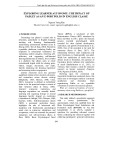
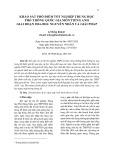
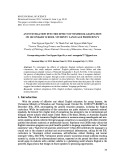
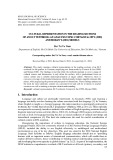
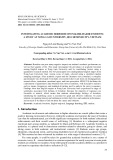

![Tài liệu Từ vựng tiếng Anh Trung cấp [mới nhất]](https://cdn.tailieu.vn/images/document/thumbnail/2025/20250913/nguyentuan250421@gmail.com/135x160/99491757910839.jpg)
![Tài liệu Từ vựng Tiếng Anh theo chủ đề [mới nhất]](https://cdn.tailieu.vn/images/document/thumbnail/2025/20250913/namdhuet@gmail.com/135x160/83251757753810.jpg)


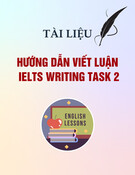
![Tài liệu Từ vựng tiếng Anh cho bé [chuẩn nhất/mới nhất]](https://cdn.tailieu.vn/images/document/thumbnail/2025/20250731/huadaithesang2509@gmail.com/135x160/18631754013896.jpg)








